The other day, when I watched Before Sunrise (again), I spent the entire movie watching their eyes. Through quick glances, fluttery glimpses, stares, glares and glints, their story unfolded, and the movie was even more enchanting than it used to be!
I love that stupendous scene in the listening room of a record store - their eyes truly rule it. The record starts playing, a guitar plays a repetitive string of chords, they look at each other briefly, smile and look away immediately. The scene is slightly claustrophobic (they're closer than they are comfortable being?) - the low, close camera angle, them leaning against the corner of a presumably small room, music all around them. They turn away from each other for a few seconds, and slowly, her gaze sets upon him. A smile is beginning to develop on her face when he suddenly turns to her. Deftly, she looks away - as if she had never been looking at him at all.
Now, he looks in her direction - his expression shows that he likes looking at her. Julie Delpy's cuteness sure is infectious. The song starts, she smiles to herself. He smiles, his eyes are still on her. She turns to him suddenly and catches his stare, he turns away uncomfortably and there is an impish smile on her face. They both look away at the soundproof walls around them.
It's her turn now. She barely looks in his direction when he turns to her. Has he caught her? The moment is too brief for her to really know. Then, he gets a good, long look her her as she pretends to take in the music, glancing at him from the corner of her eyes a couple of times. For a second, their eyes meet. They smile, but it is a fleeting one. Then, they're back to playing their game. She looks longingly while he stares at the ceiling and turns away just as he turns to her, he does the same, they flash slightly longer smiles at each other just as the singer croons, "I have never wanted you so much/ Come here." Then, the scene cuts to them walking down a road.
The scene in the listening room isn't more than a minute long, but their relationship strengthens from this point onwards - it is almost as if that closeness, those glimpses and that music somehow convinced them that their idea might not have been such a bad one after all. Maybe, it gave them time to be with each other, but not talk - something they didn't have until then.
Later that evening, they're sitting in a church (one of the few places open at that time of the night) and they've just had an aimless conversation about how she feels like a very old woman, and how he feels like a thirteen-year-old boy. She jokes about how, earlier, on the ferris wheel, it was a very old girl kissing a very young boy. She finds it funnier than he does. Their eyes meet, his hand reaches out and tucks her hair behind her ear.
He asks her, "Have you heard about the Quakers? The Quaker religion?"
She tells him she hasn't.
He says, "I went to this Quaker wedding once. It was fantastic." He goes on, "This couple comes and kneels down in front of the whole congregation, and nobody says a word unless they feel that God moves them to say it. Then, after about an hour of," a slight pause, he turns, fixes his eyes on her, "staring at each other, they're married."
"That's beautiful. I like that," she says.
He's staring at her now, watching her eyes, hoping she will also stare at his. Three or four seconds pass, she looks away. The look on his face tells us that he has realised that they still have a long way to go.
Somehow, they traverse that path very fast, for by morning, they cannot take their eyes off each other. They hear a harpsichord play from a house on the street, they look through the window to find a man actually playing it, peering nervously into the notation in a book. They watch him for a bit, and they launch into a brief, impromptu dance to the music. He asks her if she has ever danced to a harpsichord, she says, "Of course not..." He twirls her and releases her. She stands a foot-and-a-half away from him now.
Their eyes are locked, and he says, "Wow."
"What?" she asks, unsurely.
He puts his hands on her shoulders and says, "I'm going to take your picture... So that I don't forget you, or... or... all this."
"Ok. Me too."
Then, they face each other and just stare at each other, like the Quaker wedding, soaking in each other, till their mind cannot forget the scene. Their eyes look tired, because they haven't slept all night, but there's still a freshness about their gaze, there is longing, nostalgia for just the previous day, there is this urgency, there is even a touch of sadness. The photograph they take is not of that second, or that street, or of their faces, or the harpsichord-player - it is a photograph of an entire day - of the train, the men in the cow-play, the record store, the poet, the church, the concert in the bar, the wine, of making love. The photograph captures the fact that they will probably never be together like this again, and yet, that they are just where they want to be.
***
(I just realised that two of my favourite movies are set in Vienna. I wonder if that is just a coincidence.)



